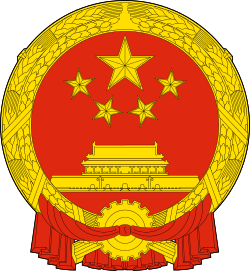China–Guinea-Bissau relations
 |
|
China |
Guinea-Bissau |
|---|---|
People's Republic of China – Guinea-Bissau relations refers to the current and historical relationship between the People's Republic of China and Guinea-Bissau. Relations were established in March 1974, several months before Guinea-Bissau's September 1974 independence. From 1990-1998, Guinea-Bissau maintained diplomatic relations with the Republic of China (Taiwan) rather than with the People's Republic. Relations were reestablished in 1998 and maintained since.
History
PR China was one of the African Party for the Independence of Guinea and Cape Verde's (PAIGC) "most enthusiastic supporters" during the twelve year (1963-1974) struggle for independence. When the PAIGC led the country to independence in 1974, it maintained close relations with the Communist Party of China until the 1990 break in favor of Taiwan.[1]
Visits
The first bilateral visit occurred in July 1975, when Guinea-Bissau's first foreign minister Victor Saúde Maria visited China. Guinea-Bissauan Presidents João Bernardo Vieira (1982) and Koumba Yala (2002) visited China as well.[2]
Economics, trade and aid
The two countries signed a number of bilateral economic agreements from 1974-1990; China built a stadium, hospital and other technological facilities. After the resumption of relations in 1998, China focused on enhancing agricultural production, housing, fisheries and power generation. Since the first Forum on China Africa Cooperation in 2000, Beijing has successfully delivered $113 million in Official Development Assistance to Guinea-Bissau.[3] Major officially financed development projects in Guinea-Bissau include:
- $48.5 million to modernize Guinea-Bissau's telephone network[4]
- $18 million to construct a parliamentary building in 2003[5]
- Cancellation of $5.8 million of Guinea-Bissau's debt to China in 2001[6]
As of 2002, Guinea-Bissau imported approximately US$4.5 million of Chinese goods.[2] In 2010, China announced a $1 billion fund designed to increase trade between the PRC and Portuguese speaking countries.[7]
Culture
A number of Guinea-Bissauan students have studied in China; in 1998, thirteen Bissau-Guineans were studying in China. China has also sent medical personnel to Guinea-Bissau, with approximately 7 working in Bissau.[2]
References
- ↑ Guinea-Bissau: China Sees a Risk Worth Taking Center for Strategic and International Studies
- 1 2 3 Guinea-Bissau China Internet Information Center, 10 October 2006
- ↑ Austin Strange, Bradley C. Parks, Michael J. Tierney, Andreas Fuchs, Axel Dreher, and Vijaya Ramachandran. 2013. China’s Development Finance to Africa: A Media-Based Approach to Data Collection. CGD Working Paper 323. Washington DC: Center for Global Development.
- ↑ Austin Strange, Bradley C. Parks, Michael J. Tierney, Andreas Fuchs, Axel Dreher, and Vijaya Ramachandran. 2013. China’s Development Finance to Africa: A Media-Based Approach to Data Collection. CGD Working Paper 323. Washington DC: Center for Global Development.
- ↑ Austin Strange, Bradley C. Parks, Michael J. Tierney, Andreas Fuchs, Axel Dreher, and Vijaya Ramachandran. 2013. China’s Development Finance to Africa: A Media-Based Approach to Data Collection. CGD Working Paper 323. Washington DC: Center for Global Development.
- ↑ Austin Strange, Bradley C. Parks, Michael J. Tierney, Andreas Fuchs, Axel Dreher, and Vijaya Ramachandran. 2013. China’s Development Finance to Africa: A Media-Based Approach to Data Collection. CGD Working Paper 323. Washington DC: Center for Global Development.
- ↑ Austin Strange, Bradley C. Parks, Michael J. Tierney, Andreas Fuchs, Axel Dreher, and Vijaya Ramachandran. 2013. China’s Development Finance to Africa: A Media-Based Approach to Data Collection. CGD Working Paper 323. Washington DC: Center for Global Development.
